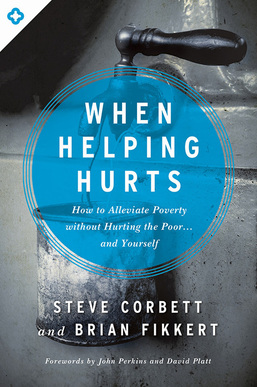| The first chapter of "When Helping Hurts" left us with the conclusion that as Christians, we are to seek the restoration of the world. The culmination of all history is leading to that event. While we as humans do not bring about such redemption on our own, and while we will never fully see such redemption until God brings all things to their fullness, we are to pursue restoration of the world, and push back against the evil that currently pervades it. The second and third chapters of the book begin to paint a picture of what this brokenness and restoration look like. |
The authors point to a study the World Bank conducted after their utter failure in obliterating poverty throughout the world. Interestingly, the survey of impoverished people indicated that the materially poor rarely focused on their lack of resources. Rather, they constantly talked in terms of "shame, inferiority, powerlessness, humiliation, fear, hopelessness, depression, social isolation, and voicelessness." So while many are attempting to alleviate poverty throughout the world by educating the poor (assuming lack of knowledge and a relationship with nature is the issue), handing out material resources (assuming stuff and a relationship with nature is the issue), or correcting deviant behaviors (assuming personal sins are the issue), the deeper issue is truly grounded in a broken relationship with self and others - both problems that require much more involvement and/or introspection when attempting to fix.
Unfortunately, the West's materialistic tendencies cause us to misdiagnose poverty as largely being a result of lacking material resources. So to fix poverty, we just throw resources at individuals. When those individuals don't change their lifestyle, we then judge them and shake our heads. That self-righteousness not only shames the poor into having an even worse self-image (their main problem to begin with), but it also further ruins the middle class and wealthy problem of having a god-complex - which mars their relationship with self. That lowering of the poor and elevating of the wealthy increases the gap between the two groups, exacerbating the other root problem behind endemic poverty, which is broken societal relationships and a feeling of powerlessness within a society. And while the workaholic wealthy struggle from high rates of marital issues, suicides, and drug abuse - their god-complexes become entrenched in their "assistance" of the poor, blinding them to their need for restoration as well. In a materialistic society, people are blind to problems that aren't displayed through the absence of material goods. So while the wealthy look down on the impoverished poor, they are blind to their own impoverishment that they worsen through their "help."
In the end, there are three main points the authors make throughout chapters three and four.
1) Material poverty is not always rooted in a lack of material things. Some/often times material poverty is a symptom of a much deeper relational issue with God, self, others, and/or nature.
2) Our worldview and assumptions play a large role in our tendency towards particular areas of brokenness, as well as our diagnoses of others. For the wealthy in the West, the tendency is towards materialism (self/God-Nature), judgmentalism (self/others) and god-complexes (self/self. With the poor, it is often played out in feelings of worthlessness (self/self) and oppression (self/others).
3) In our materialistic culture, those with sufficient material possessions fail to see their own brokenness and need for restoration. At the same time, the emphasis on materialism prevents the wealthy from showing true love and grace to those who lack material goods, and prevents them from appreciating the many beautiful contributions and personalities of the poor.
So in the end, we need to recognize that we are all broken, we are all positive contributors, and we need to understand our worldviews, assumptions, and potential pitfalls in our relationships.




 RSS Feed
RSS Feed